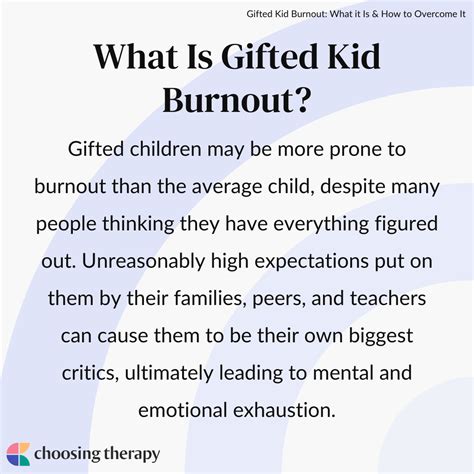
Gifted children, often lauded for their exceptional abilities and academic achievements, are increasingly sharing their experiences of post-high school struggles, revealing a phenomenon dubbed “gifted kid burnout” that manifests as anxiety, depression, and a lack of direction in adulthood. Many former child prodigies are taking to social media platforms like TikTok to discuss the pressures and expectations they faced, and the difficulties they now encounter in navigating a world that doesn’t always reward innate talent as predictably as their early academic environments did.
The transition from being a “gifted kid” to a functioning adult is proving to be a complex and often disheartening journey for many. Having excelled effortlessly in their early years, these individuals often find themselves ill-equipped to handle the challenges of higher education, career choices, and personal relationships, leading to a sense of disillusionment and inadequacy. The pressure to constantly perform at an exceptional level, instilled from a young age, can morph into paralyzing anxiety when faced with real-world obstacles.
“There’s this expectation that everything should come easily to you,” explains one former gifted student in a viral TikTok video, “and when it doesn’t, you feel like a failure.” This sentiment echoes the experience of many who were identified as gifted early in life. The label, while initially boosting self-esteem and opening doors to advanced learning opportunities, can inadvertently create a fixed mindset, where intelligence is viewed as an inherent trait rather than a skill that can be developed through effort and perseverance.
The issue stems, in part, from how “giftedness” is defined and nurtured. Traditional educational systems often focus on rote memorization and standardized testing, rewarding quick learners who excel at these tasks. This can lead to a superficial understanding of concepts and a lack of genuine intellectual curiosity. Furthermore, the emphasis on grades and accolades can overshadow the importance of developing crucial life skills such as resilience, problem-solving, and emotional regulation.
Dr. Carol Dweck, a Stanford University psychologist, has extensively researched the impact of mindset on achievement. Her work highlights the difference between a fixed mindset, which believes intelligence is static, and a growth mindset, which believes intelligence can be developed through dedication and hard work. Gifted children who are praised solely for their intelligence may develop a fixed mindset, making them more likely to avoid challenges and give up easily when faced with setbacks.
The consequences of gifted kid burnout can be far-reaching. Some individuals struggle with imposter syndrome, constantly fearing that they will be exposed as frauds. Others experience difficulty in choosing a career path, feeling overwhelmed by the pressure to live up to their perceived potential. Many report feelings of anxiety, depression, and a general sense of dissatisfaction with their lives.
One anonymous Reddit user shared their experience: “I was always the ‘smart kid’ in school. Now, I’m in my late twenties and feel completely lost. I have no idea what I want to do with my life, and I’m terrified of failing.” This sense of aimlessness and fear of failure is a common thread among those who have experienced gifted kid burnout.
The current conversations on social media are helping to destigmatize these struggles and provide a platform for former gifted students to share their experiences and support one another. Many are finding solace in realizing that they are not alone and that their struggles are valid. These online communities offer a space to discuss the unique challenges of navigating adulthood after being labeled as gifted.
However, experts warn that simply acknowledging the problem is not enough. There is a need for systemic changes in how gifted children are identified and nurtured. Educational programs should focus on fostering a growth mindset, encouraging intellectual curiosity, and developing essential life skills. Parents and educators should also be mindful of the pressure they place on gifted children, ensuring that they have opportunities to explore their interests, make mistakes, and learn from their experiences without fear of judgment.
Moreover, mental health support should be readily available to gifted students, both during their school years and as they transition into adulthood. Therapists and counselors who are familiar with the challenges of giftedness can provide valuable guidance and support in navigating the complexities of identity, achievement, and well-being.
The rise of social media platforms has played a significant role in bringing this issue to light. Platforms like TikTok, Reddit, and Twitter have become virtual support groups for former gifted children, allowing them to share their stories, connect with others who understand their experiences, and find resources to help them cope. The hashtag #giftedkidburnout has garnered millions of views on TikTok, demonstrating the widespread recognition of this phenomenon.
The discussion around gifted kid burnout also highlights the limitations of traditional methods of identifying and nurturing giftedness. Many argue that the current system is too focused on academic achievement and neglects other important aspects of intelligence, such as creativity, emotional intelligence, and practical skills. A more holistic approach to gifted education would recognize and cultivate a wider range of talents and abilities, preparing students for success in all areas of life.
Furthermore, the emphasis on competition and achievement in many gifted programs can create a toxic environment that fosters anxiety and perfectionism. Students may feel pressured to constantly outperform their peers, leading to feelings of inadequacy and burnout. A more collaborative and supportive learning environment would encourage students to work together, share their ideas, and learn from one another.
The long-term effects of gifted kid burnout can be significant. Some individuals may struggle with chronic anxiety, depression, and low self-esteem. Others may experience difficulty in forming and maintaining relationships, as they may have been socialized to prioritize achievement over connection. Many may feel a sense of regret or unfulfilled potential, wondering if they could have achieved more if they had been given the right support and guidance.
Addressing the issue of gifted kid burnout requires a multi-faceted approach involving educators, parents, mental health professionals, and the gifted individuals themselves. By working together, these stakeholders can create a more supportive and nurturing environment that allows gifted children to thrive and reach their full potential without sacrificing their well-being.
In conclusion, the phenomenon of gifted kid burnout is a growing concern that highlights the need for a more nuanced and holistic approach to gifted education. By fostering a growth mindset, encouraging intellectual curiosity, developing essential life skills, and providing mental health support, we can help gifted children navigate the challenges of adulthood and lead fulfilling and meaningful lives. The conversations happening online are a crucial first step in raising awareness and destigmatizing these struggles, but further action is needed to create systemic changes that support the well-being of gifted individuals throughout their lives. The realization that early academic success does not guarantee later life fulfillment is a wake-up call for parents, educators, and the gifted individuals themselves, emphasizing the need for a more balanced and sustainable approach to nurturing talent.
Frequently Asked Questions (FAQ)
1. What is gifted kid burnout?
Gifted kid burnout refers to the phenomenon where individuals who were identified as “gifted” or “high-achieving” children experience significant struggles in adulthood, often manifesting as anxiety, depression, a lack of direction, and difficulty adapting to challenges outside of academic settings. This is often attributed to the intense pressure to perform, the fixed mindset fostered by early accolades, and a lack of development in crucial life skills like resilience and emotional regulation. As the Yahoo article explains, many former prodigies struggle to cope with the realities of adult life, finding that their early success doesn’t translate into effortless achievement in a more complex world.
2. What are the common signs and symptoms of gifted kid burnout?
Common signs and symptoms include:
- Anxiety and Depression: Feeling overwhelmed by pressure to succeed and meet expectations, leading to anxiety and depressive episodes.
- Imposter Syndrome: Constantly fearing being exposed as a fraud or not being as capable as others perceive them to be.
- Lack of Direction: Feeling lost and unsure about career paths or life goals, often paralyzed by the fear of making the wrong choice.
- Perfectionism: Setting impossibly high standards for themselves and becoming overly critical of their own performance.
- Difficulty Coping with Failure: Having a hard time dealing with setbacks and challenges, leading to avoidance or giving up easily.
- Low Self-Esteem: Despite past achievements, struggling with feelings of inadequacy and self-doubt.
- Procrastination: Delaying tasks due to fear of failure or not being able to meet expectations.
- Difficulty with Self-Care: Neglecting their physical and emotional well-being due to a focus on achievement.
- Social Isolation: Withdrawing from social interactions due to anxiety or a feeling of not fitting in.
- Feelings of Regret: Wondering if they made the right choices in life and feeling like they haven’t lived up to their potential.
3. What are the potential causes of gifted kid burnout?
Several factors contribute to gifted kid burnout:
- Fixed Mindset: Being praised solely for intelligence can lead to a belief that abilities are fixed, making individuals afraid to take risks or face challenges.
- Pressure to Perform: Constant expectations of excellence can create intense pressure and anxiety.
- Lack of Resilience: Over-reliance on innate talent can hinder the development of coping mechanisms for dealing with setbacks.
- Emphasis on Achievement Over Learning: Focusing on grades and accolades rather than genuine intellectual curiosity.
- Lack of Social and Emotional Skills: Neglecting the development of crucial life skills such as emotional regulation, communication, and teamwork.
- Unrealistic Expectations: Internalizing societal expectations to achieve great things and make a significant impact on the world.
- Poorly Designed Gifted Programs: Programs that focus on rote memorization and standardized testing rather than fostering creativity and critical thinking.
- Parental and Teacher Pressure: Parents and educators inadvertently placing undue pressure on gifted children to excel.
- Identity Crisis: Difficulty defining themselves beyond their “gifted” label.
- Fear of Failure: Paralyzing fear of not meeting expectations or losing their “gifted” status.
4. How can parents and educators help prevent gifted kid burnout?
Parents and educators can play a crucial role in preventing gifted kid burnout by:
- Fostering a Growth Mindset: Encouraging the belief that intelligence can be developed through effort and perseverance.
- Focusing on Effort and Process: Praising effort, persistence, and problem-solving skills rather than innate ability.
- Promoting Intellectual Curiosity: Encouraging exploration of diverse interests and fostering a love of learning for its own sake.
- Developing Resilience: Providing opportunities to face challenges and learn from mistakes.
- Teaching Emotional Regulation Skills: Helping children identify and manage their emotions in healthy ways.
- Encouraging Self-Care: Promoting healthy habits such as exercise, sleep, and mindfulness.
- Providing Mental Health Support: Making therapy and counseling readily available to gifted students.
- Creating a Supportive Environment: Fostering a sense of belonging and acceptance in the classroom and at home.
- Setting Realistic Expectations: Avoiding placing undue pressure on gifted children to achieve at all costs.
- Encouraging Collaboration: Promoting teamwork and cooperation rather than competition.
- Helping Children Define Themselves Beyond Giftedness: Supporting the development of interests and identities outside of academic achievement.
- Teaching Time Management Skills: Helping children prioritize tasks and manage their time effectively.
- Promoting a Balanced Lifestyle: Encouraging participation in extracurricular activities, hobbies, and social events.
- Providing Opportunities for Creative Expression: Fostering creativity through art, music, writing, and other forms of self-expression.
5. What resources are available for individuals experiencing gifted kid burnout?
Several resources can help individuals experiencing gifted kid burnout:
- Therapy and Counseling: Seeking professional help from a therapist or counselor who specializes in working with gifted individuals.
- Online Support Groups: Joining online communities and forums where former gifted students can share their experiences and support one another. Platforms like Reddit (r/GiftedAdults) and online forums dedicated to gifted adults can be invaluable.
- Books and Articles: Reading books and articles on giftedness, mindset, and emotional well-being. Recommended reading includes works by Carol Dweck, such as “Mindset: The New Psychology of Success.”
- Websites and Organizations: Exploring websites and organizations dedicated to supporting gifted individuals, such as the National Association for Gifted Children (NAGC) and Supporting Emotional Needs of the Gifted (SENG).
- Mental Health Apps: Utilizing mental health apps that offer mindfulness exercises, meditation techniques, and coping strategies.
- Self-Help Techniques: Practicing self-care activities such as exercise, meditation, and spending time in nature.
- Career Counseling: Seeking guidance from a career counselor to explore different career paths and identify their strengths and interests.
- Academic Support: Utilizing academic resources such as tutoring, writing centers, and study groups.
- Mentorship Programs: Connecting with mentors who can provide guidance and support.
- Community Involvement: Engaging in volunteer work or other activities that provide a sense of purpose and connection.
- Mindfulness Training: Learning mindfulness techniques to reduce stress and improve focus.
- Time Management Workshops: Attending workshops to improve time management skills and reduce procrastination.
- Stress Management Courses: Enrolling in courses that teach stress management techniques.
- Peer Support Groups: Participating in peer support groups where individuals can share their experiences and learn from one another.
The key is to acknowledge the struggles, seek help when needed, and focus on developing a growth mindset, resilience, and a balanced approach to life. The social media discussions are crucial in normalizing these experiences and encouraging individuals to seek the support they need to thrive.









